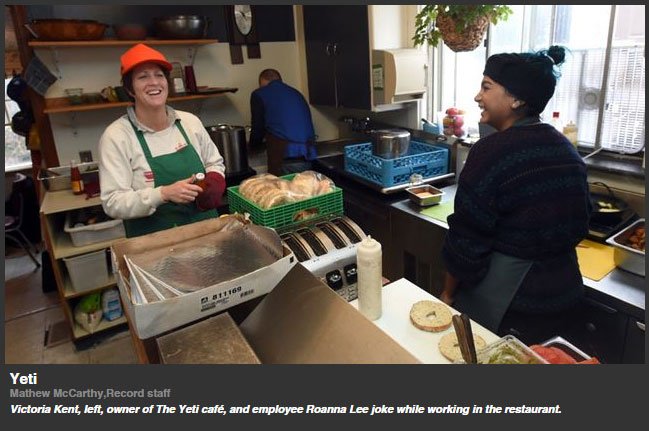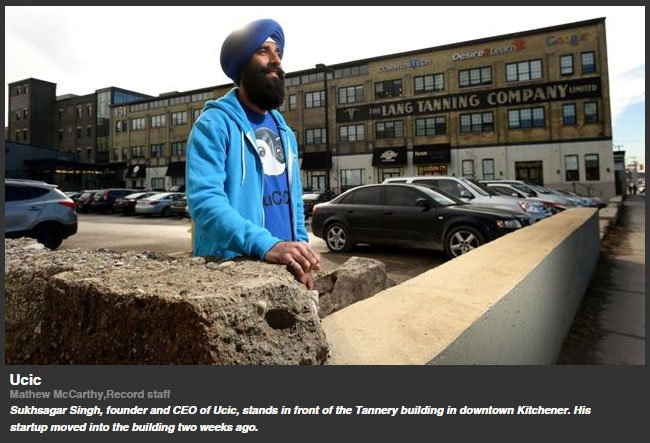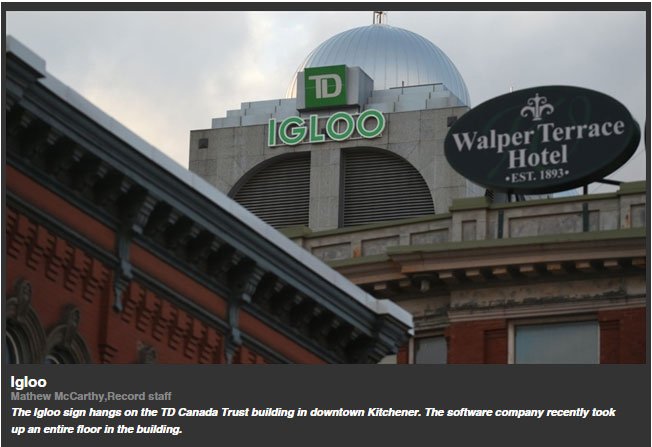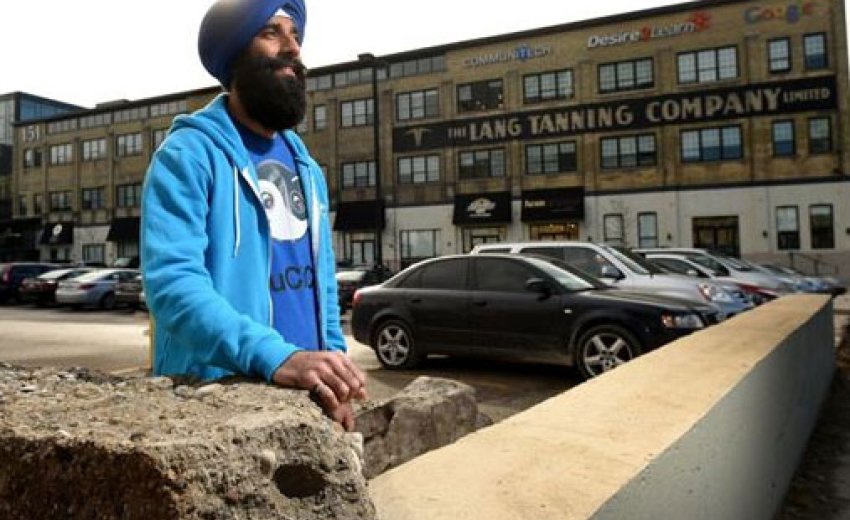KITCHENER — Victoria Kent is busy in the kitchen of The Yeti café four mornings a week making 85 lunches for employees of the fast-growing startup Vidyard.
The catering revenue accounts for 25 per cent of the business at her restaurant on Eby Street in downtown Kitchener. It makes up for the slower times during the week. "It's been huge for us, really big," Kent says.
On Saturdays, the quirky space inside The Yeti and the collection of chairs and tables outdoors are often packed. Many of the regulars work at startups.
"I have really benefitted from the startups around here," Kent says.
The Yeti is at 14 Eby St. N., across from the Kitchener Market. On Saturdays, the market and the nearby sidewalks are packed with shoppers.

With all the yoga pants, expensive bicycles and high-end baby strollers around, there is no hint of Eby Street's gritty past when it was part of the stroll for sex trade workers.
A few blocks away, at 48 Weber St. W., an old apartment building is being gutted. Until recently, the building was a dump, with graffiti all over the halls, used needles on the floors and squatters in many units. The City of Kitchener declared it unfit for human habitation and the occupants were forced out.
Toronto-based Urbanfund Corp. bought the property and is spending about $1.3 million on renovations. New hardwood floors, gas fireplaces and shiny appliances will be the new normal in the building, known as the Windermere. Project manager Stephen Litt plans to market the 40 restored apartment units to young professionals, aged 25 to 39, who are working downtown. Many of them, he says, work at startups.
There is "overwhelming demand because it is under a thousand bucks, and it is super central to absolutely everything," he says.
Litt also was involved in the restoration of the Royal and Wales Apartments on College Street a few years ago. The units there were quickly leased to young people working in startups. There is no parking at either the Royal and Wales or the Windemere.
"You don't need parking downtown," Litt says. "Why would you ask for more parking when we are building a train connecting our two cores?"
Kitchener's downtown is changing, and one of the key drivers is the slow, steady arrival of tech startups. Five years ago there were few, if any startups here. Now, more have moved into the core, joining more established technology firms such as Google, D2L (formerly Desire2Learn), Igloo and games maker Electronic Arts.
In the last two weeks, two more startups — Pebble and PiinPoint — finalized plans to move into the core. Pebble is the smartwatch company founded by Eric Migicovsky, a University of Waterloo graduate and a rock star among young tech entrepreneurs. After two-record breaking Kickstarter crowdfunding campaigns, Pebble remains based in California, but about 10 employees will soon be working out of space in the office tower at 305 King St. W.
PiinPoint develops software that helps businesses, real estate brokers and landlords find the best place to locate a new venture. Jim Robeson and Adam Saunders, two UW grads, launched the startup two years ago. They landed a spot in the Y Combinator accelerator in Mountain View, Calif., and secured investments from venture capitalists in Silicon Valley. They returned to Kitchener and completed UW's Velocity program for startups last week. They have leased space for the startup's 14 employees inside the Tannery building at Charles and Victoria streets.
"We are excited about that. We love the downtown core and what it offers for our employees," Robeson says. "In my opinion there is very much a growing environment of fellow startups within the downtown core and that environment is only getting richer."
More than 45 startups with a combined workforce of 800 people have set up shop in the core in the past 3 1/2 years after leaving space in the Tannery building, where both the Communitech Hub and Velocity Garage incubator are located, says Brian Bennett, Kitchener's manager of business development.
The Velocity program, which also includes the Velocity Foundry on Water Street, and Communitech, the organization that supports the local tech sector, are the main sources of startups in the downtown. As both programs expand, Bennett predicts that up to 25 startups a year could establish offices in the city core.
The city's Startup Landing Pad program provides a matching grant of up to $20,000 and an accessibility grant of up to $45,000 to landlords who renovate upper floors in old downtown buildings. So far, the program has been used for one renovation, but six more applications are underway.
The influx of startups is having spinoff benefits for other businesses in the downtown.
B@Themuseum, a new restaurant located in space in front of Themuseum on King Street, says startups account for a significant part of its business. "We see them very much on a daily basis for lunch, and then on Fridays especially," says Robin Lefebvre, the restaurant's manager.
"I only think it is getting stronger, getting bigger and more prevalent down here," adds Aaron Clyne, the restaurant's chef. "It only seems to be positive and growing. We are happy to have them."
In the evenings, the startup crowd accounts for anywhere from 10 per cent to 75 per cent of the customers, Lefebvre and Clyne say. Clyne notes that he taps into a Kitchener startup called Local Line to help him source fresh, local produce, dairy, meats and other supplies.
Down the block and around the corner on Ontario Street, The Adventurers Guild Board Game Café & Tavern also is seeing benefits from the startup surge. Shelves along the walls are packed with board games of every description in addition to the classics, such as chess. "We have been really well supported by the gaming community here, and I have to say the startups downtown are probably rife with a lot of people interested in geek culture and gaming," says owner Kate Cox.
The nascent startup community in downtown Kitchener really got going after Communitech moved from Waterloo to the Tannery building in 2010. The region's innovation hub, it always has 70 to 80 fledgling startups operating in what used to be a former leather tannery.
Although the steady trickle of new firms setting up shop in the core is still a small fraction of the tech startups being created in the region — in the past five years, about 1,845 have formed in Kitchener and Waterloo, according to Communitech — it is having a noticeable impact. In the four-year period ending in 2014, the downtown's workforce grew by 2,000 people to a little more than 14,000, according to the city. About 800 of those new jobs are in startups, and that figure is increasing all the time.
"What is exciting for us is the number of startups that want to be in the core," says Cory Bluhm, an urban planner who works in Kitchener's economic development office. "They are not here just because it is an affordable place to be, they actually want to be in the core."
Sukhsagar Singh, founder and chief executive officer of Ucic (pronounced you see, I see), is a testament to that. His mobile app allows people to connect with other users around the world and share information about traffic, weather, lineups, shopping specials and emergencies. For months, he worked in Toronto's startup scene, but he says support services are scattered around the big city so he brought his startup to Kitchener two weeks ago. "I have moved here, got a place up on Francis Street … just so we can be connected to the ecosystem, to the campus," he says.
The
startups in Waterloo Region are known to support each other. Singh
believes this is the place to gain a critical mass of users to better
demonstrate the commercial possibilities of Ucic. The startup has a
spot in the Velocity Garage.
Velocity, UW's program for technology entrepreneurs, nurtured many of the startups in downtown Kitchener. It runs two incubators in the downtown — the Velocity Garage for software startups in the Tannery and the Velocity Foundry for hardware startups on Water Street. They are home to more than 60 startups.
The Velocity incubators will be brought under one roof next year when the program more than doubles its space in the Tannery building to 36,000 square feet, providing enough room for 120 budding startups. The additional space became available following Google's move from the Tannery building to the nearby Breithaupt Block development.
In the last three years, Velocity has awarded $1.3 million in cheques to promising startups that compete in pitch competitions held three times at year in UW's Student Life Centre. The winners also get space in one of Velocity's incubators — the two in downtown Kitchener and a life sciences lab on UW's campus in Waterloo.
Velocity director Mike Kirkup says 36 companies that left the program are still in business today and 61 per cent remained in Waterloo Region. About 19 per cent moved to Silicon Valley and another 19 per cent moved to Toronto. "The reasons they are moving into Toronto is because of their market," Kirkup says. "One of our companies that left the Velocity Garage successfully was Vendor Hero, and they need to be close to the Ontario Food Terminal because they sell to produce vendors."
Startups tend to attract more startups so the concentration of startups in the downtown builds momentum. As Kirkup is talking, the founders of a startup called Grobo leave the Velocity Foundry to walk down Charles Street to talk to Stephen Lake, a co-founder of Thalmic Labs, developer of the Myo gesture control arm band. "That's a five-minute walk. That kind of density is extremely appealing," Kirkup says.
Firms that leave Velocity tend to support startups in the program. As graduating companies prosper and grow, Kirkup sees donations come back to the program. Most of the $1.3 million handed out so far in the Velocity pitch competitions are donations from companies founded by UW graduates.
Startups and technology companies have transformed several downtown buildings, including the Tannery building (a former leather tannery on Charles Street), the Breithaupt Block (a former rubber factory and later an auto parts plant), 117 King St. W. (a former furniture factory), 24 Charles St. W (another former furniture factory), 305 King St. W., and now 8 Queen St. N. (a building that used to house the Goudies Department Store).
The Mies van der Rohe-style office building at 305 King St. W. was acquired by the Perimeter Develop Corp. two years ago. For the next six months, units in the 12-storey tower were renovated and transformed into funky, creative spaces with concrete floors, huge windows, and exposed ducts and pipes hanging from the ceiling.
In the past 18 months, Perimeter has leased out more than 45,000 square feet of space in the building. About 20,000 square feet of space remains, says Craig Beattie, Perimeter's co-owner. "It has been really successful," he says. "Early stage, creative, tech-type companies have been really drawn to the building."
Perimeter is betting big on the tech sector in downtown Kitchener. It also owns two smaller buildings near 305 King St. W. It spent $50 million redeveloping the Breithaupt Block and bought and restored 117 King St. W., where Vidyard is currently located. The company, which has its own offices in a building at 119 King St. W., was a partner in the purchase of the historic Walper Hotel, which is currently under renovation.
"Communitech landing at the Tannery, that was kind of the visionary piece coming into play and that really started to spawn the startup scene," Beattie says over lunch in TWH Social, the restaurant that replaced the former Rum Runner Pub in the basement of the Walper building. "The startups, I would say it has been steady," he says. "It is not a rampage for space."
Beatty says downtown landlords need to improve their properties to attract specialty retailers, cafés and restaurants that will slowly follow the arrival of the startups. He says landlords also need to restore and improve office space if they want to attract startups and tech firms. That's what's currently happening with the building at 8 Queen St. N. The building, originally one-half of the long-closed Goudies Department Store, is being renovated as the offices for Vidyard, a video analytics company that is growing rapidly.
That building encapsulates the story of the downtown's rise, decline and technology-driven rejuvenation. After the department store closed in 1988, the city ended up with ownership of the building because of unpaid property taxes. The city tried to sell the building, but nobody wanted it. It was empty for about 15 years, a jarring reminder of urban decline. Eventually, an artist bought half the building and stayed there until it was purchased earlier this year by Voisin Capital and Brick by Brick Developments.
Startups figured prominently in Kitchener's 2011 economic development plan. It included a grant program for landlords to renovate old buildings along King Street. The city also branded the area of the downtown within a 15 minute walk of King and Victoria streets as the Innovation District and tailored small business services to startups.
Rod Regier, executive director of the city's economic development department, remembers meeting with Iain Klugman, CEO of Communitech, and other tech leaders in early 2011. Communitech had been in the Tannery building for less than a year and it was already packed with startups. After the meeting, Klugman pulled Regier aside. "He said: 'Rod, you've got a tiger by the tail here,'" recalls Regier. "People galvanized around this idea pretty quickly."
The city's next economic development plan will focus on helping hardware startups getting established in empty industrial spaces in areas outside of the downtown, Regier says.
Kitchener Mayor Berry Vrbanovic watched the downtown evolve while he was a city councillor. He credits the positive changes to strategic investments the city made to attract the University of Waterloo School of Pharmacy and the Wilfrid Laurier University School of Social Work to the downtown. "This goes back to some of the commitments we made 10 years ago," he says.
Startups clustered around the Tannery building and then moved slowly down King Street and now can be found as far as the Kitchener Market at the other end of the downtown. Boom Digital Media Group bought the empty building at the corner of King and Eby streets earlier this year.
Vrbanovic says Night Shift, Summer Lights and Tame the Lane are some of the events and festivals that are a direct result of the increasing number of young people living and working in the downtown.
As mayor, one of his top priorities is to improve train service between downtown Kitchener and Toronto. Two-way, all-day Go train service is the rallying cry among leaders in the tech sector and their political supporters who want the Toronto-Waterloo Region corridor to become a single, super cluster of technology companies. A larger cluster will only strengthen the startup economy here, Vrbanovic says. "That is fundamental," he says.
At the same time startups are establishing a larger presence in the core, the downtown's residential population is growing. Large condo projects at King and Victoria streets, and next to City Hall will be occupied soon, adding hundreds of residents to the core. "It is really going to become, even more than it has been, a place where people can live, work and play 24-7," Vrbanovic says.
That in turn will help attract retailers, restaurants and services into empty store fronts, he says.
It is what Beattie calls the "third wave" of economic rejuvenation and perhaps the hardest part of revitalizing the downtown. The experience of pedestrians walking on the sidewalks creates the strongest impressions and needs the most work, Beattie says.
Klugman believes the growing startup economy has the potential to transform downtown and then the entire city. "It's quit remarkable," he says. "I purposely drive by the TD tower (the TD Canada Trust building at King and Ontario streets) and look at the Igloo sign up there. It is a sign post along the way that we are actually making a difference."
The sign on top of the building certainly illustrates how the downtown is changing. The sign, 14 floors above the street, features large, green letters that glow at night.
Igloo, a provider of software for intranets and document sharing, moved downtown nine years ago. It has expanded rapidly in past three years and with 90 employees ran out of space in its previous location on Frederick Street. Igloo recently took over a floor in the TD building. Dan Latendre, the firm's CEO, says it will expand into another floor by next June.

Latendre credits Communitech and the Accelerator Centre at UW for the startup scene in downtown Kitchener. He predicts that the expanding tech presence will transform the city core during the next five years as more high-paid workers live and play downtown.
"Unfortunately, downtown we've got to figure out the social services," Latendre says. "A problem we have in downtown right now is that there are so many social services. Some of my young staff are afraid to walk alone at night. That has to be addressed."
But his main concern for the downtown's growing tech sector is the recruitment and retention of talent. Universities and colleges provide a good pool of inexperienced new hires, but tech companies and startups also need experienced hands, Latendre says.
"That scares me the most right now," he says. "And my question is out there to local officials, to provincial and federal governments: 'How are we going to attract this talent so you can help companies like us grow?'"
